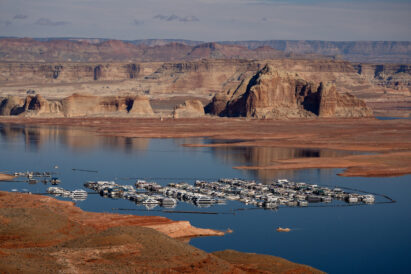Senate Republicans approve resolution expanding motorized access around Lake Powell
A resolution that re-opens terrain to off-road vehicles in Glen Canyon National Recreation Area now awaits the president’s signature

Spenser Heaps for Utah News Dispatch
Boats can be seen at anchor at the Wahweap Marina in Lake Powell near Page, Arizona, on Sunday, Feb. 2, 2025.The U.S. Senate voted to expand motorized access in Utah’s Glen Canyon National Recreation Area, passing a resolution on Thursday to overturn a Biden-era policy that closed a handful of roads to certain off-road vehicles.
If signed by President Donald Trump, the resolution would open up some of the more remote regions of the recreation area to dirtbikes, side-by-sides and other off-road vehicles, the latest development in nearly two decades of controversy over motorized access in the area.
Under the Biden administration’s rule, 25 roads amounting to roughly 26 miles would be off limits to specific vehicles — conventional vehicles like trucks or SUVs are still allowed to travel the routes.
But specialized off-road vehicles like dirtbikes, ATVs or side-by-sides are restricted. Environmental groups, along with lawmakers opposed to the resolution, say these vehicles have potential to cause severe damage to the region’s most sensitive and pristine environments. Republicans, as well as motorized recreation activists, have called it another example of federal overreach that ignores the will of locals.
Last week, the U.S. House passed companion legislation sponsored by Utah GOP Rep. Celeste Maloy. Both resolutions state the Biden administration’s rule “shall have no force or effect,” invoking the Congressional Review Act, which allows Congress to review and overturn federal rules.
Managed by the National Park Service, Glen Canyon National Recreation Area was formed in 1972 and borders multiple national parks and monuments, like Bears Ears, Capitol Reef and Canyonlands. The area’s biggest draw is Lake Powell, the country’s second-largest reservoir, which attracted more than 4.7 million visits in 2025, according to National Park Service data.
For years, environmental groups have criticized the National Park Service over what they say is a loose regulation of off-road vehicles around the recreation area. And in 2005, groups sued the park service over its lack of enforcement — in 2008, the service settled and agreed to create an off-road vehicle management plan.
Then in 2021, the first Trump administration released a new plan that opened up much of the recreation area to all kinds of motorized use.
The Southern Utah Wilderness Alliance sued two years later, arguing the administration’s plan failed to take all of the environmental impacts into consideration — the National Park Service settled again, agreeing to close the Lake Powell shoreline to motorized use, unless water levels were “sustainable” and put restrictions on ATV and side-by-side use in certain areas.
In January, the rule was finalized. It affects a small section of the recreation area, preventing off-road vehicles and ATVs on segments of the Poison Spring Loop and a section of the Flint Trail, remote and challenging, yet popular, motorized routes in the recreation area. About 4,930 acres of shoreline were also covered.
For members of the Utah congressional delegation, the rule was antithetical to the concept of a recreation area.
“If it says, ‘National Recreation Area’ on the map, people should be able to recreate there,” said Sen. Mike Lee, a Republican, in a statement, calling environmentalists’ push for a management plan “a classic case of sue-and-settle policymaking where bureaucrats caved to activists and cut Americans out of the process.”
Sen. John Curtis, also a Republican, said the resolution will help ensure public lands are more accessible.
“Utahns have responsibly accessed Glen Canyon for decades, and Washington’s one-size-fits-all restrictions threatened not only that access but also the livelihoods and traditions of rural communities. This legislation restores the balance between conservation and responsible recreation — something Utahns have always led on,” Curtis said in a statement.
The Southern Utah Wilderness Alliance pointed out that more than 250 miles of roads within the recreation area still remain open to all vehicles, and the group criticized Republicans for chipping away at National Park Service protections.
“Congressional Republicans, who have previously said that the National Park Service was immune from their destructive agenda, made it clear: they lied. Led by the Utah delegation, they voted to undermine the Park Service and instead bowed to extreme motorized recreation in some of the most remote and wild parts of Glen Canyon National Recreation Area,” said Hanna Larsen, a staff attorney for the alliance. “Today’s action means that Orange Cliffs, Gunsight Butte, and Canyonlands National Park’s Maze District will be impaired by noisy, destructive off-highway vehicles. It’s a dark day for all who love Southern Utah and Glen Canyon’s wild places.”



